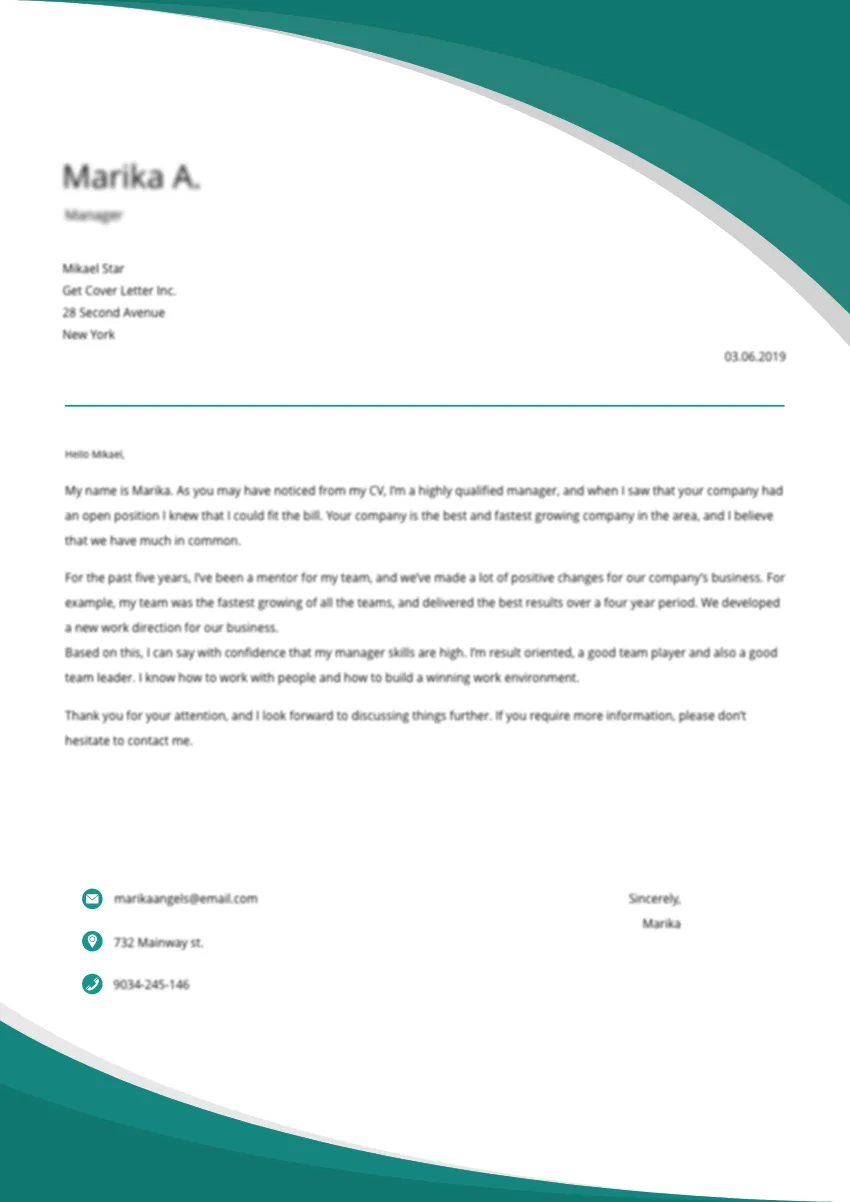Crafting a Winning Restaurant Job Cover Letter
A well-crafted restaurant job cover letter is your first opportunity to make a positive impression on a potential employer. It’s more than just a formality; it’s a crucial tool in showcasing your qualifications, enthusiasm, and personality. This guide will walk you through the essential steps of writing a cover letter that grabs attention and increases your chances of landing an interview. Whether you’re applying for a server position, a chef role, or a management opportunity, a strong cover letter can set you apart from other candidates. It provides a space to tell your story, highlight your relevant experience, and demonstrate why you’re the perfect fit for the restaurant. This guide is crafted to help you create a compelling cover letter that will help you get hired.
Understanding the Purpose of a Cover Letter
The primary purpose of a cover letter is to introduce yourself and your qualifications to a potential employer in a more personalized way than your resume allows. It provides context to your resume, elaborating on your skills, experience, and why you’re interested in the specific job and the restaurant. It is important to remember that a cover letter is not just a repetition of your resume. Instead, it should expand on key points and highlight aspects of your experience that are most relevant to the position. The best cover letters demonstrate your knowledge of the restaurant, your understanding of the role, and your enthusiasm for the opportunity. It helps to build a connection with the hiring manager by showcasing your personality and communication skills, which are very important in the hospitality industry.
Highlighting Your Skills and Experience
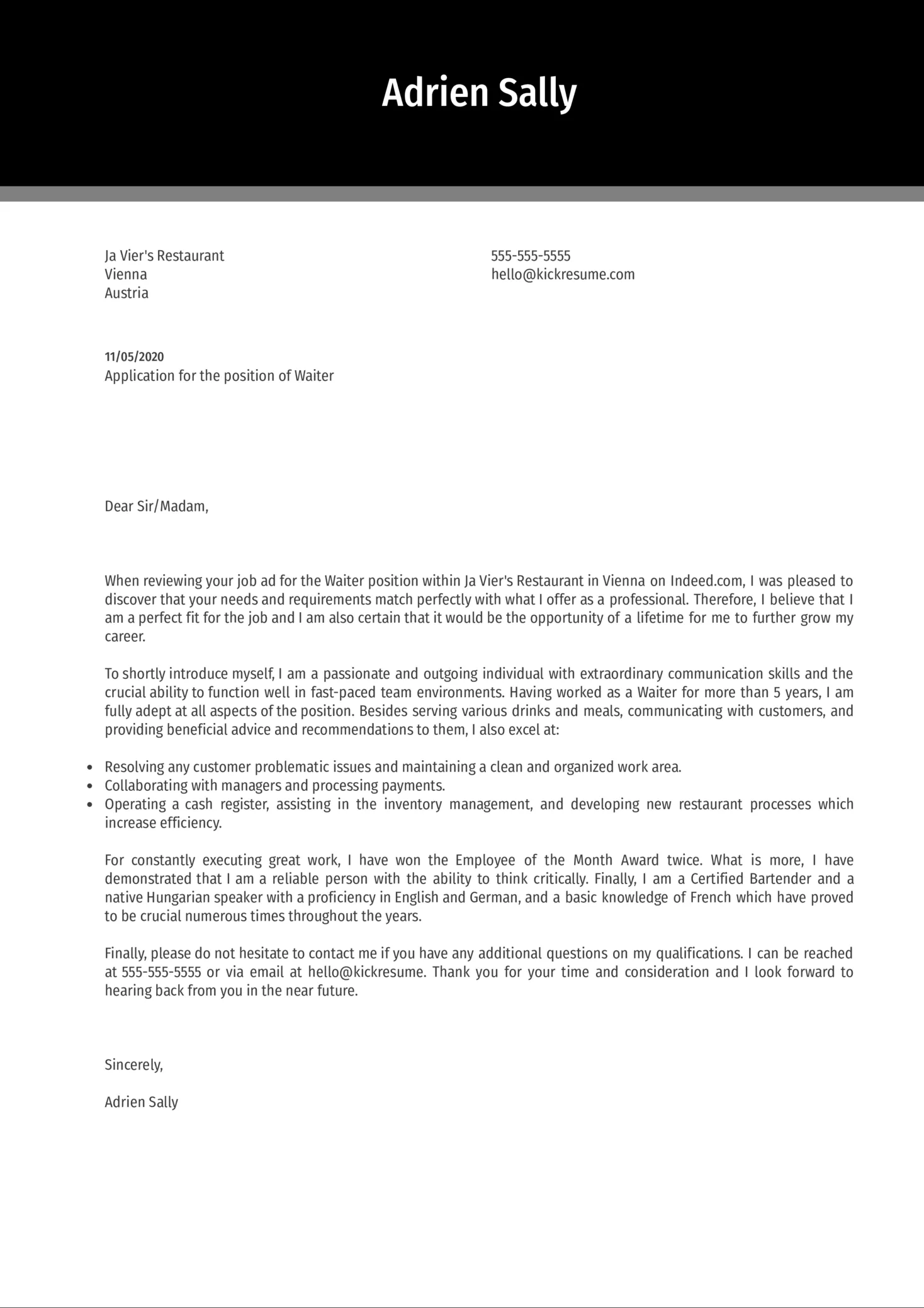
Your cover letter is a chance to shine the spotlight on your relevant skills and experience, making it easy for the hiring manager to see why you’re a great fit. Don’t just list your skills; demonstrate them with examples. Use the STAR method (Situation, Task, Action, Result) to tell compelling stories about your past experiences. When discussing your skills, focus on those that align with the job description. Mentioning specific skills, such as the ability to manage a team, provide excellent customer service, or work efficiently under pressure, will demonstrate that you are a strong candidate. Quantify your accomplishments whenever possible to showcase your impact. For instance, instead of saying “managed a team”, you might say “Managed a team of 10 servers, leading to a 15% increase in customer satisfaction scores.”
Showcasing Relevant Restaurant Experience
Detail your past restaurant experience, highlighting roles that are relevant to the job you’re applying for. If you’re applying for a server position, describe your experience with taking orders, serving food and drinks, and handling customer complaints. If you’re applying for a kitchen position, explain your experience with food preparation, cooking, and maintaining kitchen cleanliness. Mention the types of restaurants you’ve worked in (fine dining, casual, fast food) and how your experience there has prepared you for this role. Be specific about your responsibilities and accomplishments in each role, using action verbs to describe your duties. For example, use words like “managed,” “trained,” “implemented,” or “resolved” to showcase your skills and expertise. Make sure to also highlight any special skills or certifications you have, like knowledge of food safety or experience with point-of-sale systems.
Emphasizing Soft Skills
Restaurant jobs require more than just technical skills; they also demand strong soft skills. Your cover letter is a great place to showcase these qualities. Highlight skills such as communication, teamwork, problem-solving, and customer service. Provide specific examples of how you’ve used these skills in past roles. For instance, describe a situation where you successfully resolved a customer complaint, worked collaboratively with a team to handle a busy shift, or used your communication skills to explain a complex menu item. Restaurants value employees who are reliable, adaptable, and able to work well under pressure. Mention these qualities and give examples to support your claims. These will help you to demonstrate your abilities and give the hiring manager confidence in your ability to succeed in the role and in the restaurant environment.
Tailoring Your Cover Letter to the Specific Job
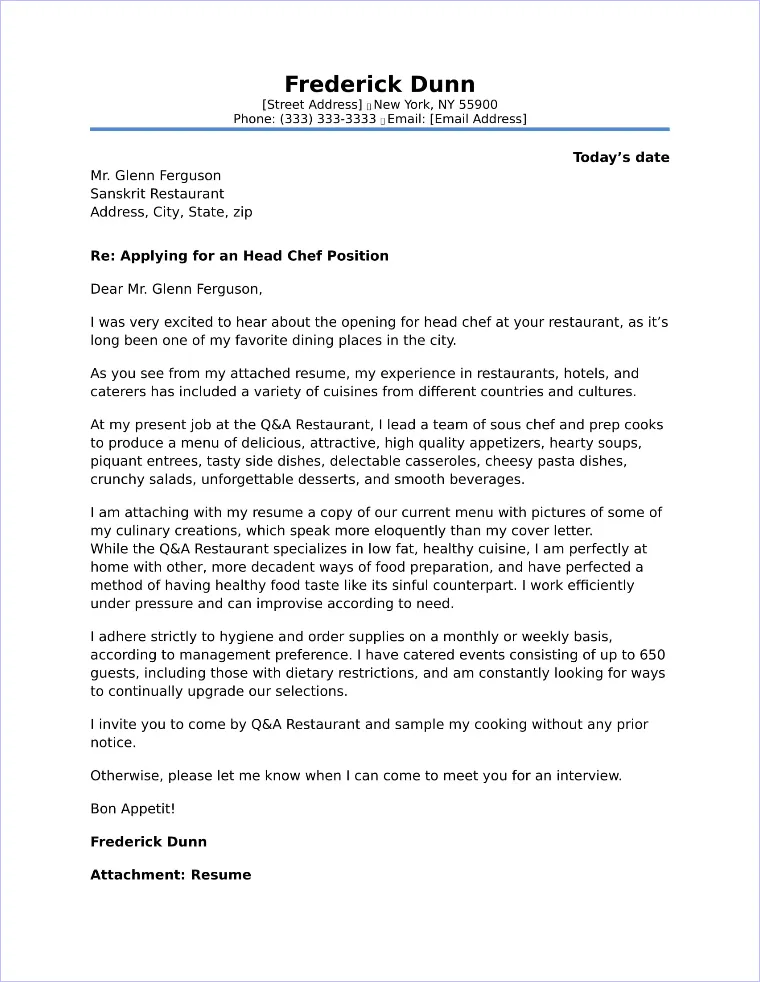
A generic cover letter is unlikely to impress a hiring manager. Instead, tailor your letter to the specific job and the restaurant. This shows that you’ve taken the time to understand the role and are genuinely interested in the opportunity. Review the job description carefully and identify the key skills and qualifications the employer is looking for. Use keywords from the job description in your cover letter to demonstrate that you meet the requirements. Then, highlight the experiences and skills that best align with those requirements. Modify your letter for each job to make it as relevant as possible. Customization is key to demonstrating your genuine interest in the position and the restaurant.
Researching the Restaurant and the Hiring Manager
Before writing your cover letter, research the restaurant to learn about its cuisine, atmosphere, and values. This will help you tailor your letter to the restaurant’s specific needs and show that you understand its brand. If possible, try to find the name of the hiring manager. Addressing your letter to a specific person is more personal and shows that you have put in the effort to learn about the company. Look for the hiring manager’s name on the restaurant’s website, LinkedIn, or other online platforms. Demonstrating your knowledge of the restaurant and its operations will set you apart from other applicants and help you make a strong impression.
Customizing Your Letter
Once you’ve researched the restaurant and the specific job, customize your cover letter to align with the information you’ve gathered. Mention specific aspects of the restaurant that appeal to you. For example, if the restaurant is known for its farm-to-table approach, highlight your passion for fresh, local ingredients. If it has a strong emphasis on customer service, emphasize your experience in providing excellent service. Show how your skills and experience align with the restaurant’s values and the job’s requirements. Personalize your letter to make it clear why you are a good fit. This level of personalization will make your cover letter stand out and show the hiring manager that you are serious about the opportunity and enthusiastic to join the restaurant team.
Formatting Your Restaurant Cover Letter
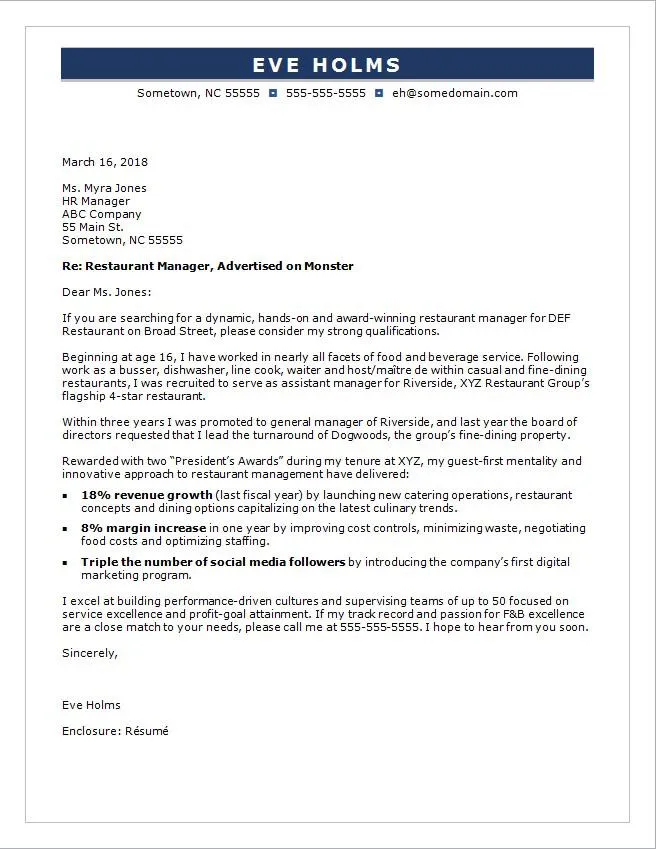
The format of your cover letter is as important as the content. A well-formatted letter is easy to read, professional, and shows that you pay attention to detail. Choose a clean, professional font like Times New Roman, Arial, or Calibri in a readable size (11 or 12 points). Use standard margins (1 inch on all sides) and single-space your text, with a double space between paragraphs. Keep your letter to one page. A concise and well-organized cover letter is more likely to be read and appreciated by a busy hiring manager. A professional format makes a great first impression and reflects well on your organizational skills.
Header and Contact Information
Start your cover letter with a header that includes your name, address, phone number, and email address. This information should be at the top of the page, either on the left or right side. Make sure your contact information is accurate and up-to-date. Include the date and the hiring manager’s name and title (if you know it), as well as the restaurant’s name and address. If you’re sending your cover letter via email, you can include your contact information at the bottom of the email instead of the header. The header helps the hiring manager to quickly identify you and easily contact you if they are interested in offering you the role.
Professional Salutation
Begin your cover letter with a professional salutation. If you know the hiring manager’s name, use “Dear Mr./Ms./Mx. [Last Name].” This personal touch shows that you have done your research. If you don’t know the hiring manager’s name, use a general salutation like “Dear Hiring Manager” or “Dear Restaurant Team.” Avoid overly casual salutations like “Hey” or “Hello.” The salutation sets the tone for the entire letter, so making it professional is important to make a good impression. A proper salutation creates a good first impression and sets the tone for the rest of your letter.
Body Paragraphs
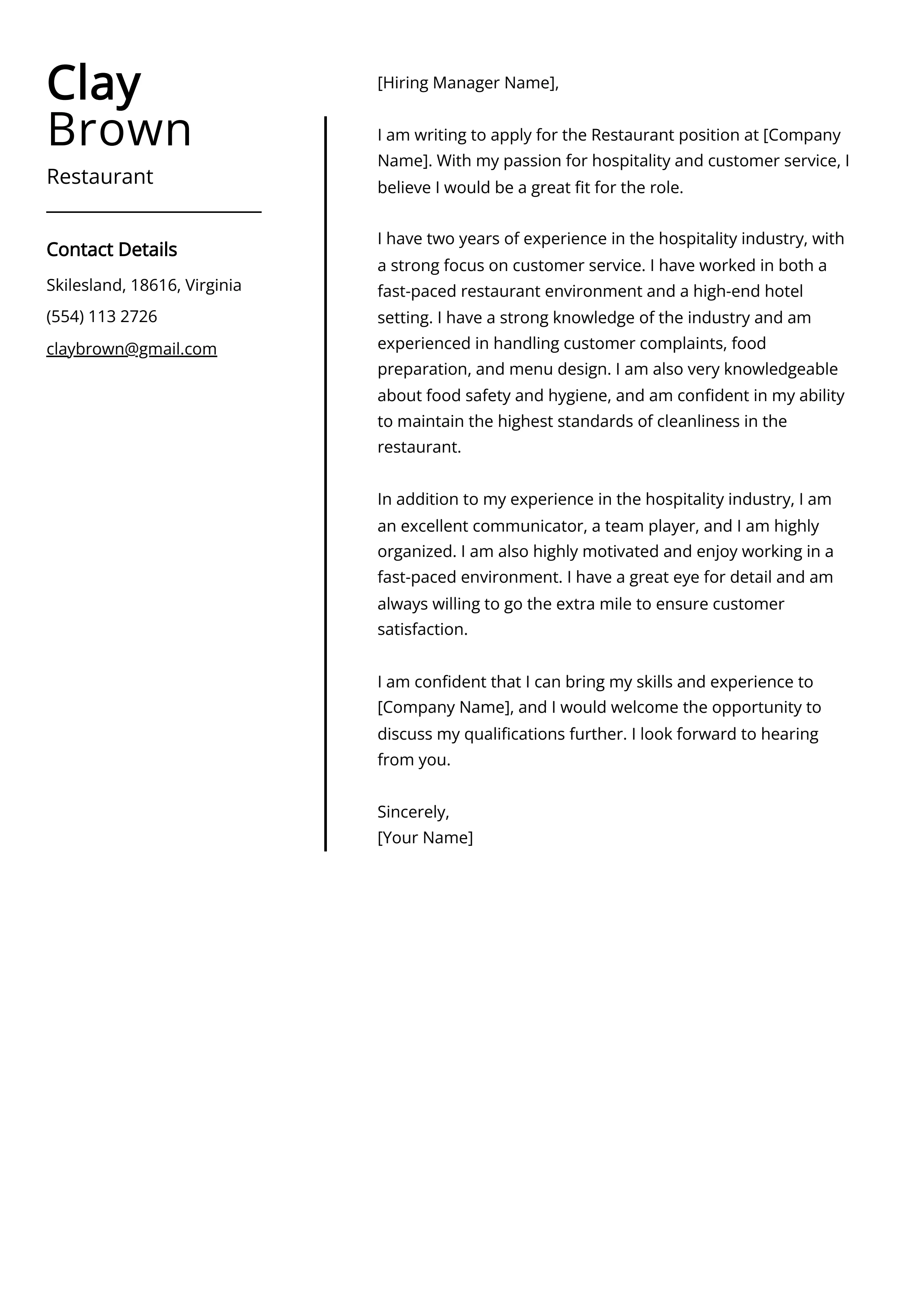
The body of your cover letter should consist of a few well-crafted paragraphs that highlight your qualifications, experience, and interest in the job. Each paragraph should focus on a specific point. Use clear and concise language to convey your message effectively. Avoid jargon or overly complicated sentences. The body is where you provide a clear and compelling narrative. The body of the cover letter should be a cohesive and easy-to-follow narrative that keeps the reader engaged. It should be organized to highlight the key aspects of your qualifications and your interest in the role.
The Opening Paragraph
The opening paragraph is your chance to grab the hiring manager’s attention. State the position you are applying for and where you found the job posting. Then, briefly introduce yourself and your primary qualifications. Express your enthusiasm for the role and the restaurant. Consider mentioning a key achievement or skill that immediately grabs the reader’s attention. The opening sets the stage for the rest of the letter. Aim to make the hiring manager want to read more. Make your opening paragraph compelling and engaging. A strong opening sets the tone for the rest of the letter and encourages the hiring manager to read further, so it must capture the reader’s attention immediately.
The Middle Paragraphs
Use the middle paragraphs to elaborate on your skills, experience, and accomplishments. Refer back to the job description and highlight the skills and experiences that align with the requirements. Use the STAR method (Situation, Task, Action, Result) to describe your achievements in detail. Provide specific examples that demonstrate your abilities and quantify your accomplishments whenever possible. Include details that clearly show why you’re a good fit for the role. This section is where you really showcase your value to the company. Focus on how your skills and experiences align with the job requirements and how you can contribute to the restaurant’s success. Use specific examples to demonstrate your abilities and provide evidence of your qualifications, and try to be as specific as possible.
The Closing Paragraph
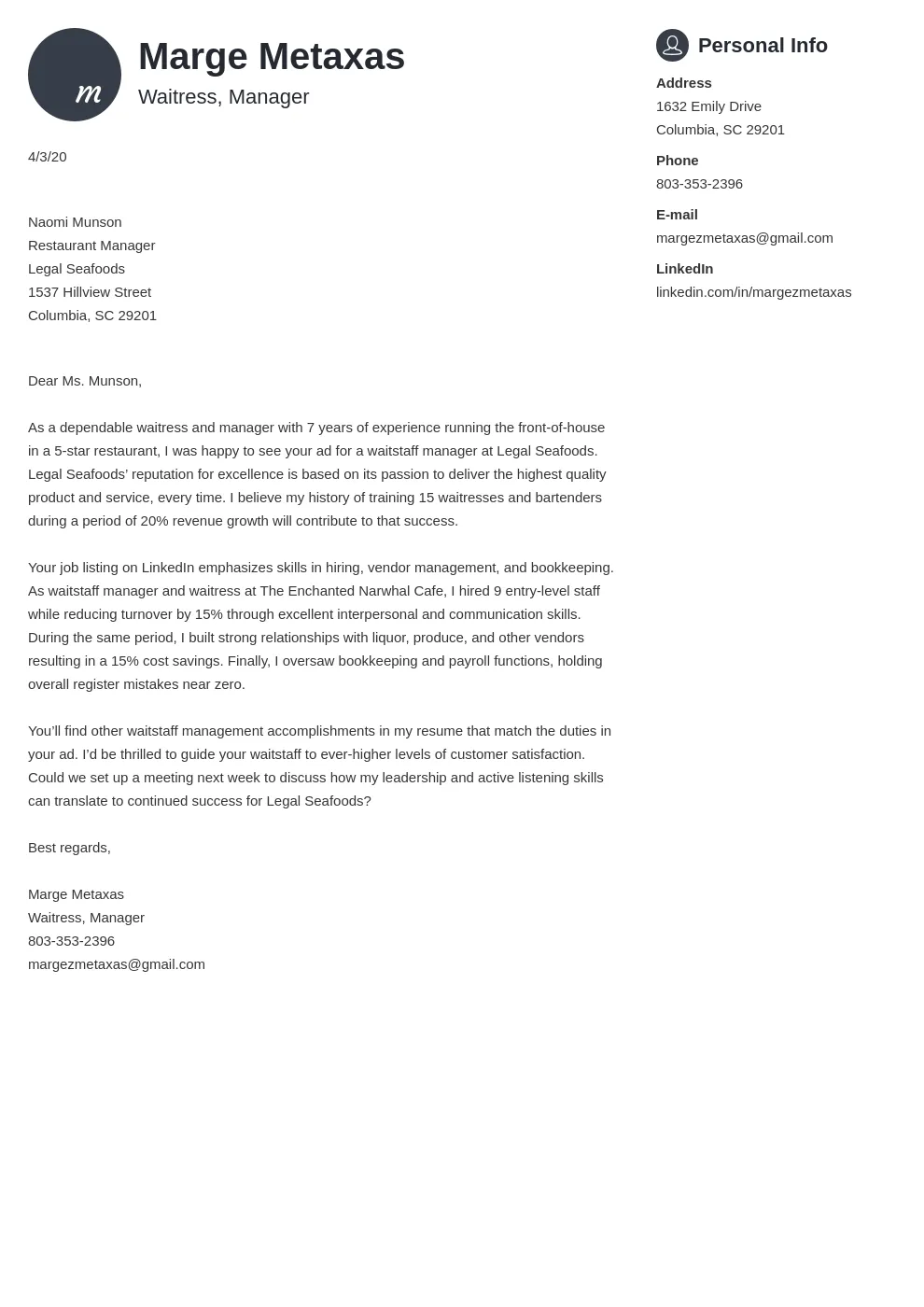
In your closing paragraph, express your interest in the position and reiterate your enthusiasm for the restaurant. Thank the hiring manager for their time and consideration. Indicate your availability for an interview and how they can contact you. Avoid being overly demanding or presumptuous. A polite and professional closing leaves a positive lasting impression. Make your closing concise and professional and restate your interest in the position. Providing your contact information one last time makes it easy for the hiring manager to reach you. It is also the last impression you leave, so it should be positive and professional.
Writing a Compelling Closing
Your closing should reinforce your enthusiasm and make it easy for the hiring manager to take the next step. Clearly state that you are available for an interview and provide your contact information once again. Use a professional closing phrase, such as “Sincerely,” “Respectfully,” or “Thank you for your time and consideration.” Avoid informal closings like “Best” or “Cheers.” Make sure to spell-check your entire cover letter before sending it to the hiring manager to avoid any errors. A strong and well-written closing can increase your chances of getting an interview. Use the closing to express your gratitude and reinforce your interest in the opportunity.
Proofreading and Editing Your Cover Letter
Before submitting your cover letter, proofread and edit it carefully. Check for any grammatical errors, spelling mistakes, and typos. Make sure your sentences are clear and concise. Ask a friend or family member to review your letter for feedback. Proofreading is essential to ensure that your cover letter is polished and professional. Errors can undermine your credibility and decrease your chances of getting an interview. Reading your letter aloud can help you catch mistakes. Take the time to thoroughly review your letter to catch any errors. A well-proofread cover letter shows that you pay attention to detail and care about your application.
In conclusion, a well-crafted restaurant job cover letter is an essential tool in your job search. By understanding its purpose, highlighting your skills and experience, tailoring your letter, formatting it correctly, and proofreading it carefully, you can significantly increase your chances of landing an interview and ultimately getting the job. By following these guidelines, you can make a positive impression and stand out from the competition. Take the time to write a compelling cover letter, and you’ll be one step closer to your dream restaurant job. Good luck!
